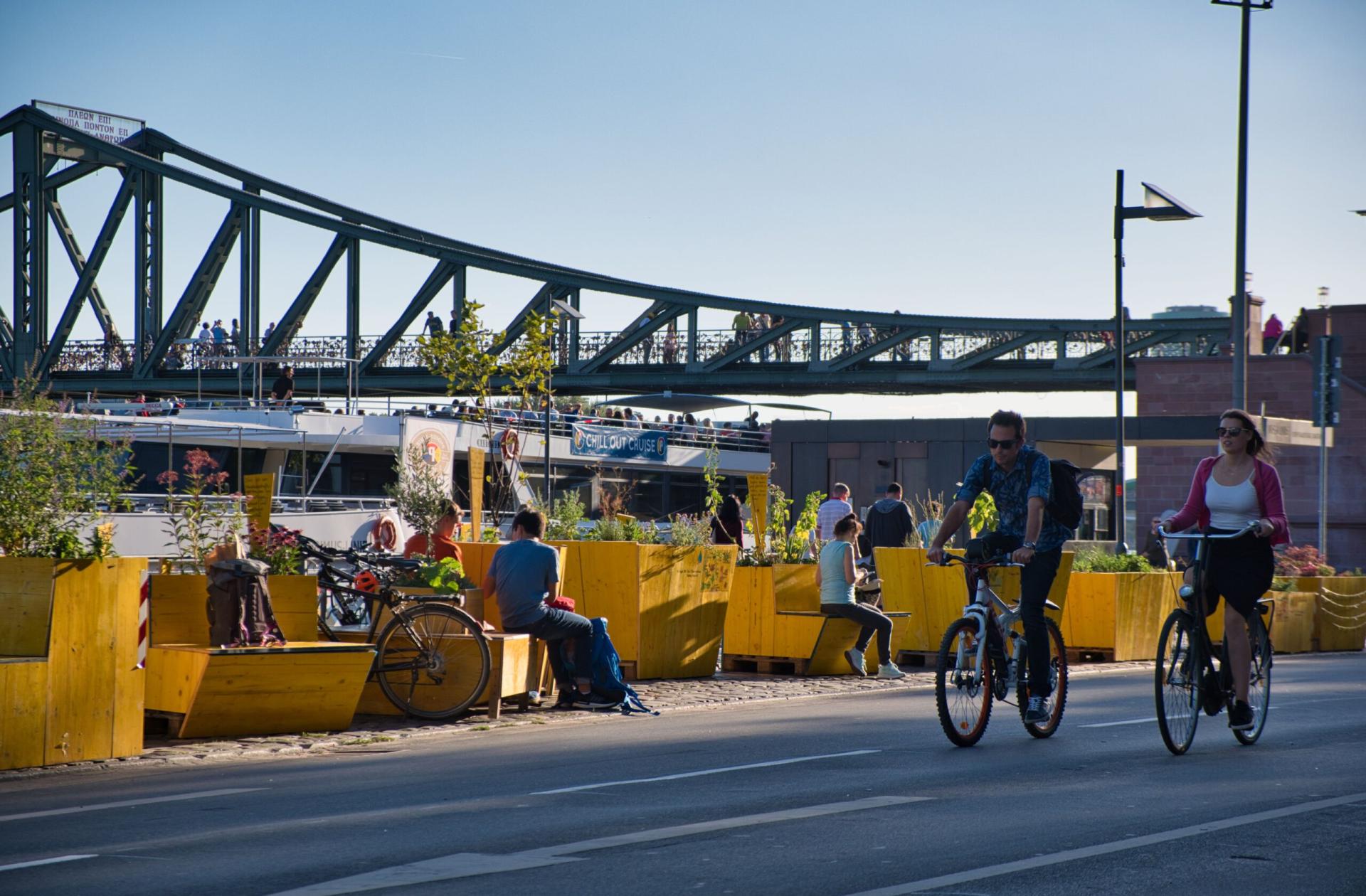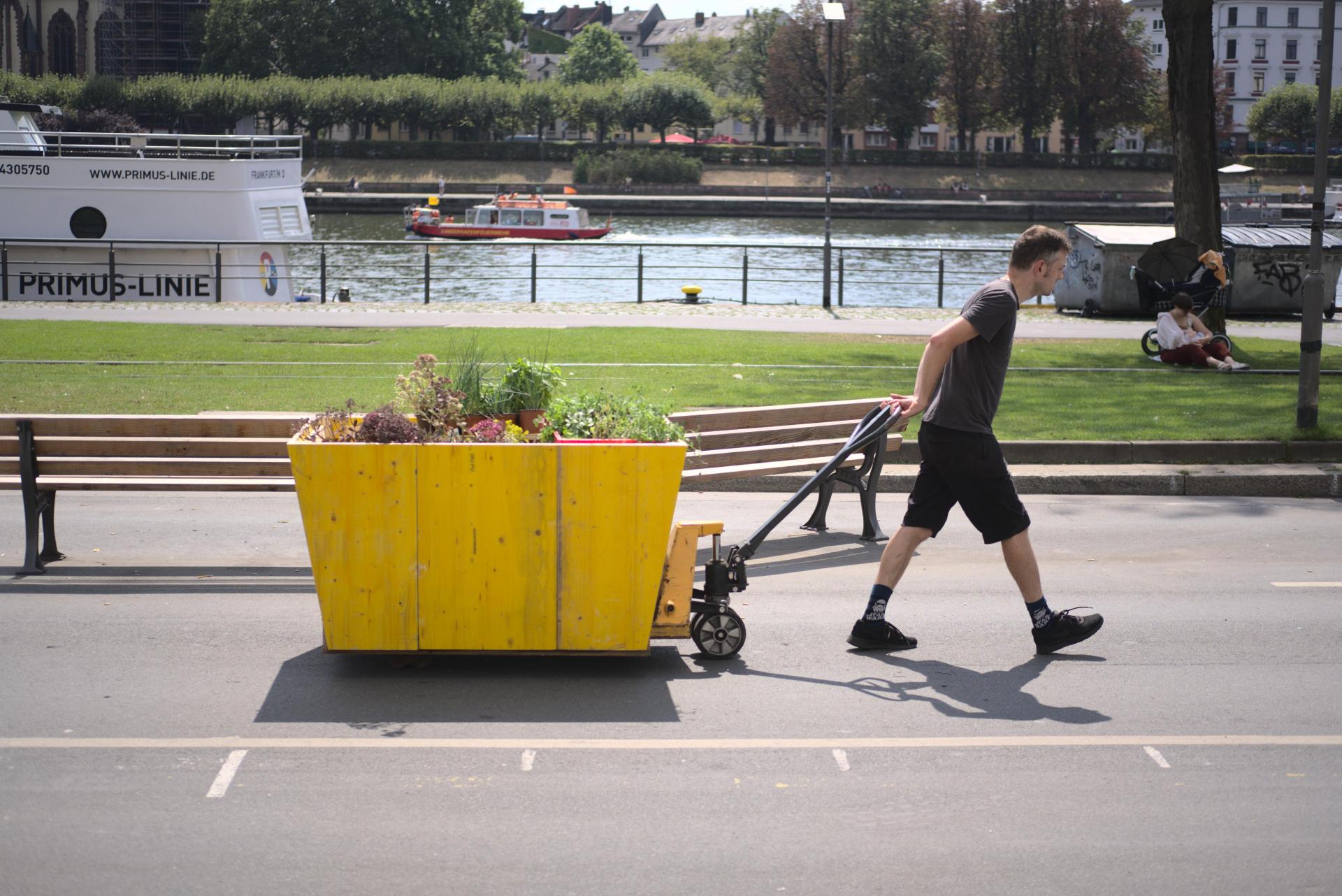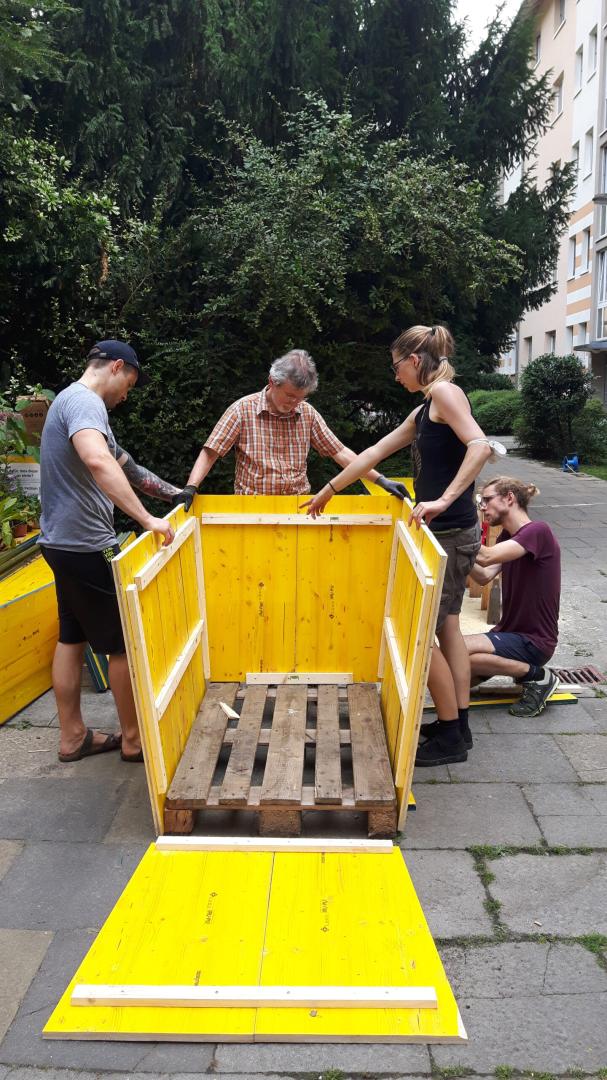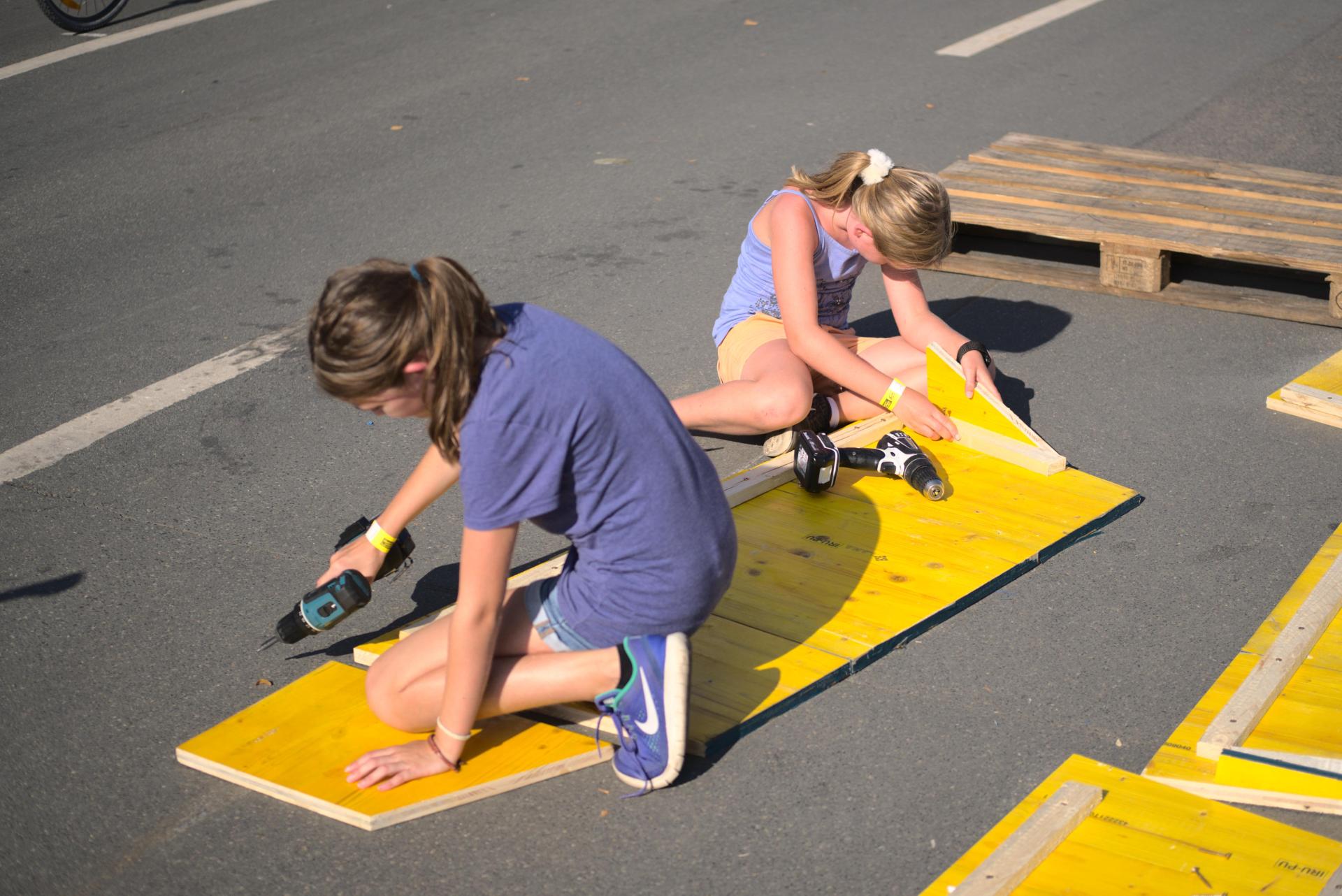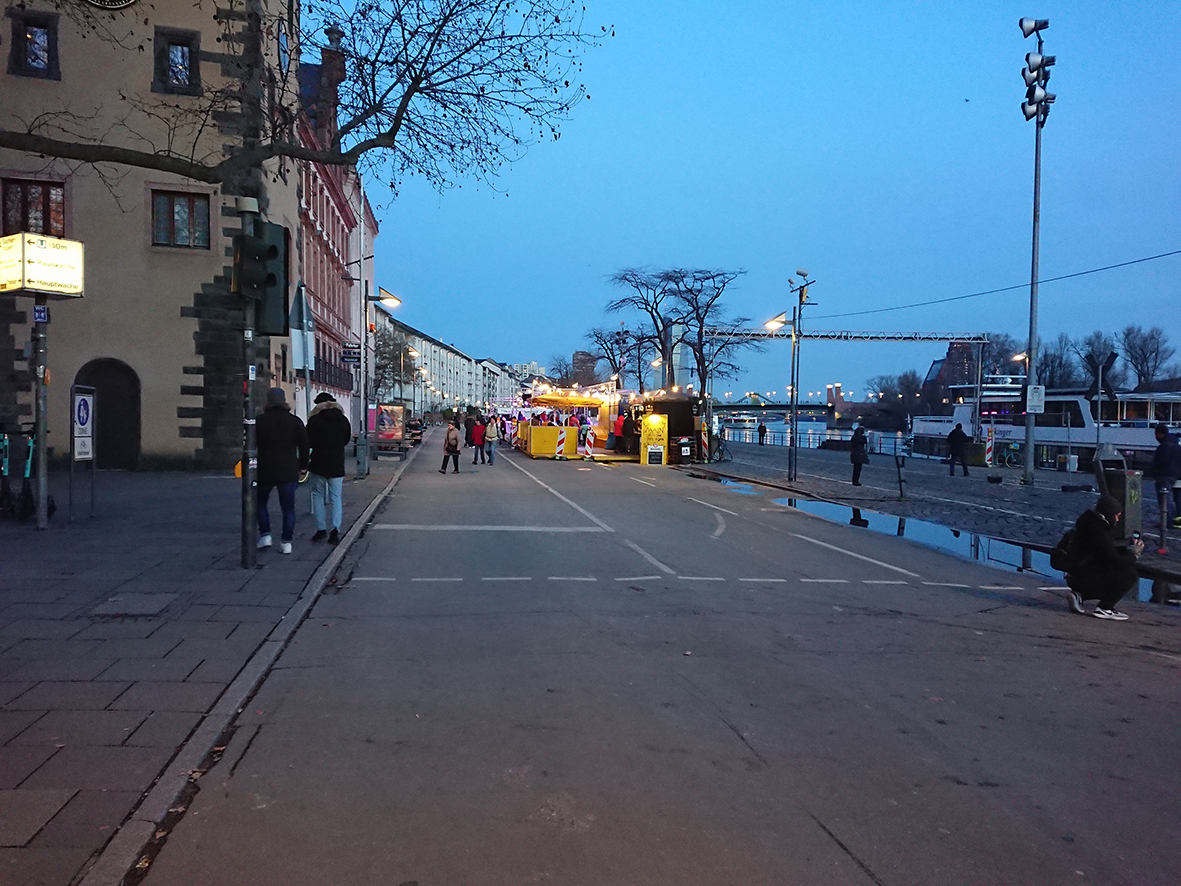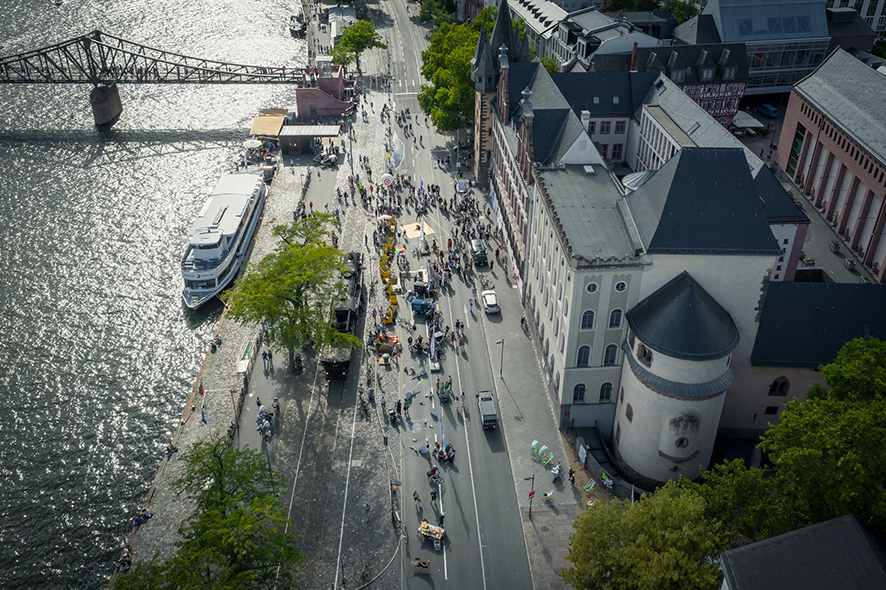Mainkai Ice Rink and Pop-Up Garden
Basic information
Project Title
Full project title
Category
Project Description
The two temporary projects on the northern bank of the Main river were sustainable urban interventions in all respects (ecological, economic and social). They not only pave the path to an inner-city traffic turnaround, but also demonstrate how public space can be used in a community-oriented and participatory way so that it benefits the city's inhabitants. Due to the temporal overlap with the Corona pandemic, the projects have been all the more important for Frankfurt's urban population.
Project Region
EU Programme or fund
Description of the project
Summary
In the summer of 2019, the city of Frankfurt am Main launched a 13-month traffic experiment in which the street section of the Mainkai on the northern bank of the Main between the Untermain Bridge and the Old Bridge was closed to car traffic and reserved for pedestrians and cyclists.
In the run-up to the closure, there were few concrete plans on the part of the city for the use or revitalization of the newly won spaces during the experimental phase. The construction of a temporary ice rink in December 2019 and January 2020 intended to turn the Mainkai, known only as a "closed street", into a place of encounter that many visitors and passers-by would remember as a positive moment despite the dark season. In addition, the ice rink was of course also an impetus for the fundamental design and appropriation of the public street space for the residents of the city. Emblematic of this, the material that formed the outdoor area for the ice rink could be made available to the newly formed residents' initiative "Mainkai for all" after it was dismantled. The weather-resistant formwork panels were used to create the colorful pop-up garden, which could be experienced by all from February until the end of August 2020.
Key objectives for sustainability
The two temporary projects on the northern bank of the Main were sustainable urban interventions in all respects (ecological, economic and social). They not only pave the path to an inner-city traffic turnaround, but also demonstrate how the inner-city public space can be used in a community-oriented and participatory way so that it benefits the city's inhabitants. Due to the temporal overlap with the Corona pandemic, the projects have been all the more important for Frankfurt's urban population.
The 1st day of action of the initiative "Making Frankfurt" (www.makingfrankfurt.de, with the participation of bb22) on August 22, 2020 has impressively shown what is possible in this wonderful place, when no cars drive, but pedestrians stroll, families and children play a protected space, cyclists and scooter riders get safely from A to B, actions to participate find space, people meet, residents, cultural institutions and visitors benefit from the peace and clean air and green spaces invite you to linger.
Key objectives for aesthetics and quality
Mainkai ice rink (December 2019 - January 2020)
Urban intervention as a model for a possible use and appropriation of public space.
The temporary ice rink on the Mainkai was located directly on the northern Mainuferstrasse, which was not accessible to vehicular traffic, approximately at the level of the Eiserner Steg. The dimensions of the ice rink were 7.5 by 30 meters, so that there was still room for rescue traffic on the remaining width of the roadway. The budget for the entire project was 100,000 euros and, according to the planning department, was met.
By establishing an ice rink in Frankfurt's immediate city center, the annual Christmas market there was to be supplemented by another offer, the retail trade was to be supported with a point of attraction during the winter season, and the experience of the street space in a central city center location was to be expanded. The newly won public space was to be filled with life. The ice rink tied in with historic moments of skating on the river, which was frozen in times past, and opened up a new way for tourists in particular to experience the city of Frankfurt.
By offering an ice rink, the closed and previously underused street was filled with life during the day and especially in the evening hours. Not only skaters took advantage of the offer of a central ice rink in the city center, but also passers-by stopped, watched, cheered on the first steps of inexperienced skaters and got into conversation with other guests. Among the users were many international guests who, accompanied, spontaneously took the opportunity to glide across the ice for a round in the pre-warmed skates.
Especially families with children benefited from the central offer in the fresh air. During the Christmas market, the little ones were offered a financially moderate and age-appropriate activity, which was gratefully accepted during the winter vacations.
Key objectives for inclusion
Pop-Up Garden (February - August 2020)
Planning and participatory implementation of a flexible neighborhood garden on a temporarily closed street.
Gardens are meeting spaces, they help people understand the environment, provide a habitat for animals and plants, and create a pleasant climate to linger in during the summer. Especially in the city with its many sealed surfaces, there is often a noticeable lack of such offerings.
With the urban garden on the closed Mainkai, these aspects were made available at a central location in Frankfurt am Main not only for residents, but for the entire urban society. In doing so, the garden sustainably fills the prominent "urban gap" created by the trial closure of the Mainkai and experiments with possible uses of the area.
Design-wise and functionally, the flower beds were complemented by benches. In addition, the concrete bollards used for the temporary road closure on the northern bank of the Main were upgraded and provided with seating. The modules were built, planted and maintained together with neighbors and residents of Frankfurt. During the project, there were also open events around the pop-up garden, inviting people to discuss the topics of nutrition and gardening as well as the future change in traffic. They create an occasion for exchange and ideally trigger an active civil society in other places as well.
Results in relation to category
As originally planned, the closure of the street to cars and other motorized vehicles ended on September 1, 2020, despite the new parameters due to the Corona pandemic and without general, reliable figures on user and traffic behavior. As a result, the temporary urban interventions on the Mainkai also had to be terminated at the end of the experiment, including the dissolution of bb22's pop-up garden. After the end of the Mainkai closure, the garden modules moved to Frankfurt's retirement homes and the German Architecture Museum. Now they invite visitors to linger and meet there.
How Citizens benefit
By offering an ice rink, the closed and previously underused street was filled with life during the day and especially in the evening hours. Not only skaters took advantage of the offer of a central ice rink in the city center, but also passers-by stopped, watched, cheered on the first steps of inexperienced skaters and got into conversation with other guests. Among the users were many international guests who, accompanied, spontaneously took the opportunity to glide across the ice for a round in the pre-warmed skates.
Especially families with children benefited from the central offer in the fresh air. During the Christmas market, the little ones were offered a financially moderate and age-appropriate activity, which was gratefully accepted during the winter vacations.
The modules of the pop-up garden were built, planted and maintained together with neighbors and residents of Frankfurt. During the project, there were also open events around the pop-up garden, inviting people to discuss the topics of nutrition and gardening as well as the future change in traffic. They create an occasion for exchange and ideally trigger an active civil society in other places as well.
Innovative character
The pop-up garden modules can be easily assembled by non-skilled workers and cared for by inhabitants so that they can be set up in the whole city. They can change parking spaces and lots into gardens for temporary use in order to show possible future uses of land. They can also create new larger public spaces for playing, meeting, discussing local matters.

